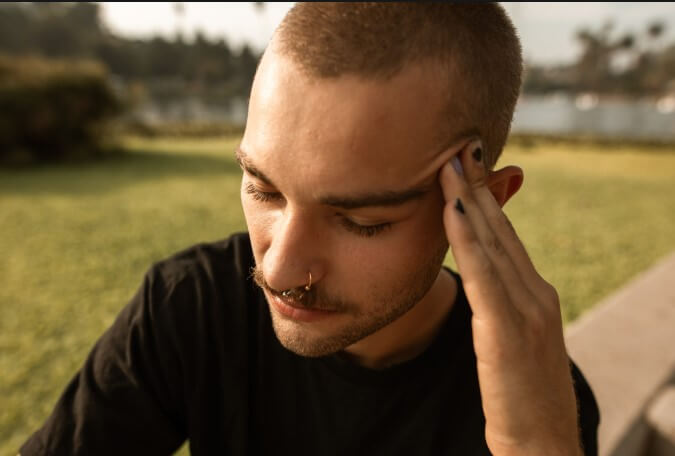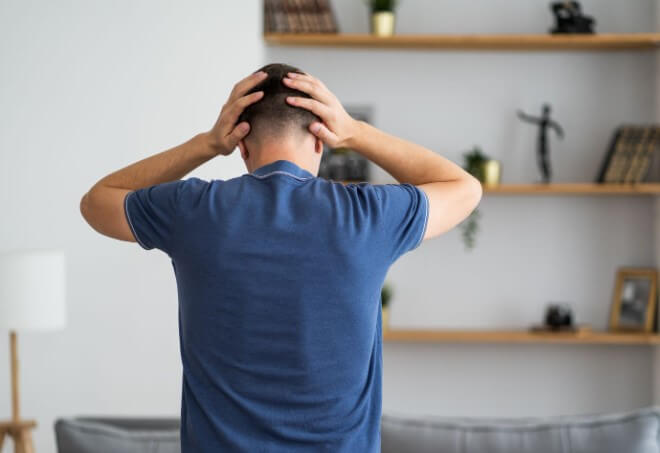Concussions are a type of brain injury that occurs when the brain is jolted or shaken inside the skull. They are often associated with sports and other physical activities, but can also be caused by falls, car accidents, and other types of trauma. While most people who experience a concussion recover within a few weeks, some may develop complications such as post-concussion syndrome, which can lead to depression.
Understanding the link between concussion and depression is crucial for those who have experienced a concussion or who are at risk of experiencing one. Depression is a serious mental health condition that can affect a person’s mood, behavior, and overall quality of life. Studies have shown that there is a correlation between concussion and depression, and that those who have experienced a concussion may be at an increased risk of developing depression. In this article, we will explore this link in more detail and discuss the risk factors, causes, and treatments for depression after a concussion.
Understanding Concussion
To understand the link between concussion and depression, it’s important to first understand what a concussion is. A concussion is a type of traumatic brain injury that occurs when the brain is shaken or jolted inside the skull. This can cause damage to the brain cells and disrupt the normal functioning of the brain.
The symptoms of a concussion can vary widely, depending on the severity of the injury. Common symptoms include headache, dizziness, confusion, memory loss, and nausea or vomiting. In some cases, a person may lose consciousness for a short period of time.
Concussions can be caused by a variety of factors, including sports injuries, falls, car accidents, and physical violence. In sports, concussions are most commonly associated with contact sports such as football, hockey, and soccer. However, they can also occur in non-contact sports such as gymnastics or cheerleading, where falls or collisions are common. It’s important to take precautions to prevent concussions, such as wearing protective gear and following safety guidelines for physical activities.
Understanding Depression
Depression is a mental health condition that affects millions of people worldwide. It is characterized by feelings of sadness, hopelessness, and a loss of interest in activities that were once enjoyed. Depression can range in severity from mild to severe and can have a significant impact on a person’s daily life.

The definition of depression includes a persistent and pervasive feeling of sadness or a lack of interest in life that lasts for at least two weeks or more. It can also involve physical symptoms such as changes in appetite or sleep patterns.
Common symptoms of depression can include feeling sad or hopeless, losing interest in activities, changes in appetite or sleep patterns, fatigue or loss of energy, difficulty concentrating, and feelings of guilt or worthlessness. More severe symptoms can include suicidal thoughts or attempts.
The causes of depression are complex and can be influenced by a variety of factors. These can include genetics, brain chemistry, and life events such as trauma or loss. Other risk factors for depression can include a family history of depression, substance abuse, and chronic medical conditions. It’s important to seek professional help if you are experiencing symptoms of depression, as treatment can help manage the condition and improve quality of life.
The Link Between Concussion and Depression
There is growing evidence to suggest that there is a link between concussion and depression. The potential link may be due to a variety of factors, including changes in brain chemistry, inflammation, and disruptions to normal brain functioning.
Studies have shown that those who have experienced a concussion may be at an increased risk of developing depression. In fact, a 2016 study published in the Journal of Neurotrauma found that those who had suffered a concussion were three times more likely to develop depression than those who had not. Additionally, a 2020 study published in the Journal of Head Trauma Rehabilitation found that those who experienced a concussion had a higher risk of developing depression and anxiety compared to those who had not.
Other research has suggested that the link between concussion and depression may be due to the impact of the injury on the brain’s reward system, which can lead to a decrease in the production of certain neurotransmitters that are linked to mood regulation.
While the exact mechanisms behind the link between concussion and depression are still being researched, it’s clear that there is a correlation between the two conditions. It’s important for those who have experienced a concussion to be aware of the potential risks of developing depression and to seek professional help if they are experiencing symptoms of depression.
Risk Factors for Developing Depression After a Concussion
There are several risk factors that can increase the likelihood of developing depression after a concussion. These risk factors can include:
- Age, gender, and previous history of depression: Younger individuals, women, and those with a previous history of depression may be more susceptible to developing depression after a concussion.
- Severity of concussion: The severity of the concussion can play a role in the likelihood of developing depression. Those who have suffered a more severe concussion may be at a higher risk of developing depression.
- Length of recovery time: The length of time it takes to recover from a concussion can also play a role in the development of depression. Those who experience a longer recovery period may be at a higher risk of developing depression.
It’s important to note that not everyone who experiences a concussion will develop depression, and there may be other risk factors at play as well. It’s important for individuals to be aware of these risk factors and to seek professional help if they are experiencing symptoms of depression after a concussion.
How Concussion Can Cause Depression
There are both biological and psychological factors that can contribute to the development of depression after a concussion.
Biological factors that can contribute to depression after a concussion include changes in brain chemistry and disruptions to normal brain functioning. The impact of the concussion can lead to inflammation in the brain, which can contribute to the development of depression. Additionally, the injury can lead to disruptions in the production of certain neurotransmitters that are linked to mood regulation, which can also contribute to the development of depression.
Psychological factors can also play a role in the development of depression after a concussion. These can include the stress and anxiety that can accompany the injury, as well as the impact that the injury can have on a person’s daily life. For example, those who have experienced a concussion may be forced to take time off work or school, which can lead to feelings of isolation and a loss of sense of purpose. These psychological factors can contribute to the development of depression.
It’s important to note that the link between concussion and depression is complex and can be influenced by a variety of factors. It’s important for those who have experienced a concussion to be aware of the potential risks of developing depression and to seek professional help if they are experiencing symptoms of depression.
Diagnosis of Depression After a Concussion
Diagnosing depression after a concussion can be challenging, as the symptoms of depression can overlap with the symptoms of the concussion itself. However, there are several common assessment tools that can be used to diagnose depression after a concussion.
One of the most commonly used assessment tools is the Patient Health Questionnaire (PHQ-9), which is a self-report questionnaire that asks about the presence and severity of depression symptoms. Other assessment tools that may be used include the Beck Depression Inventory and the Hamilton Rating Scale for Depression.
It’s important to seek professional help if you are experiencing symptoms of depression after a concussion. A healthcare professional, such as a doctor or psychologist, can assess your symptoms and provide an accurate diagnosis. They can also provide treatment options and support to manage the symptoms of depression.
It’s important to note that depression is a treatable condition, and seeking professional help is an important step in managing the condition. If you are experiencing symptoms of depression after a concussion, don’t hesitate to reach out to a healthcare professional for support.
Treatment for Depression After a Concussion
There are several treatment options available for depression after a concussion. These can include medication and therapy, as well as rest and self-care.
Medication can be an effective treatment option for depression after a concussion. Antidepressants, such as selective serotonin reuptake inhibitors (SSRIs), can help to regulate mood and reduce symptoms of depression. It’s important to discuss medication options with a healthcare professional, as they can help to determine the best medication and dosage for an individual’s specific needs.
Therapy can also be an effective treatment option for depression after a concussion. Cognitive behavioral therapy (CBT) is a common type of therapy used to treat depression, and it focuses on identifying negative thought patterns and developing strategies to manage them. Other types of therapy, such as interpersonal therapy and psychodynamic therapy, may also be helpful.
In addition to medication and therapy, rest and self-care are also important for managing depression after a concussion. This can include getting enough sleep, eating a healthy diet, and engaging in physical activity as tolerated. It’s important to avoid activities that may exacerbate symptoms, such as drinking alcohol or using drugs.
It’s important to work with a healthcare professional to develop a treatment plan that is tailored to your specific needs. Treatment for depression after a concussion can be complex, and it’s important to have a support system in place to manage symptoms and promote healing.
Prevention of Depression After a Concussion

While not all cases of depression after a concussion can be prevented, there are steps that can be taken to reduce the risk of developing depression after a concussion. Here are some tips:
- Take care of your physical health: Getting enough sleep, eating a healthy diet, and engaging in physical activity can help to promote overall health and well-being, which can reduce the risk of developing depression after a concussion.
- Seek professional help if needed: If you are experiencing symptoms of depression after a concussion, seek professional help as soon as possible. A healthcare professional can assess your symptoms and provide appropriate treatment and support.
- Stay connected with others: Social support can be an important factor in promoting mental health and reducing the risk of depression after a concussion. Stay connected with friends and family, and consider joining a support group for those who have experienced a concussion.
- Take time to rest: Rest is an important part of recovery after a concussion, and it can also help to reduce the risk of developing depression. Be sure to follow your doctor’s recommendations for rest and avoid activities that may exacerbate symptoms.
It’s also important to follow your doctor’s recommendations for recovery after a concussion. This may include taking time off work or school, avoiding physical activity or sports for a period of time, and engaging in rehabilitation or physical therapy as needed. By following your doctor’s recommendations, you can help to ensure that you are giving your brain the time and support it needs to heal and reduce the risk of developing depression.
Conclusion
In conclusion, there is a growing body of evidence to suggest that there is a link between concussion and depression. Biological and psychological factors can contribute to the development of depression after a concussion, and there are several risk factors that can increase the likelihood of developing depression after a concussion.
It’s important for those who have experienced a concussion to be aware of the potential risks of developing depression and to seek professional help if they are experiencing symptoms of depression. Treatment options for depression after a concussion can include medication, therapy, and rest and self-care. Additionally, there are steps that can be taken to reduce the risk of developing depression after a concussion, such as taking care of physical health, seeking professional help, staying connected with others, and following doctor’s recommendations for recovery.
By understanding the link between concussion and depression and taking proactive steps to manage symptoms and promote healing, those who have experienced a concussion can reduce the risk of developing depression and improve their overall quality of life.




